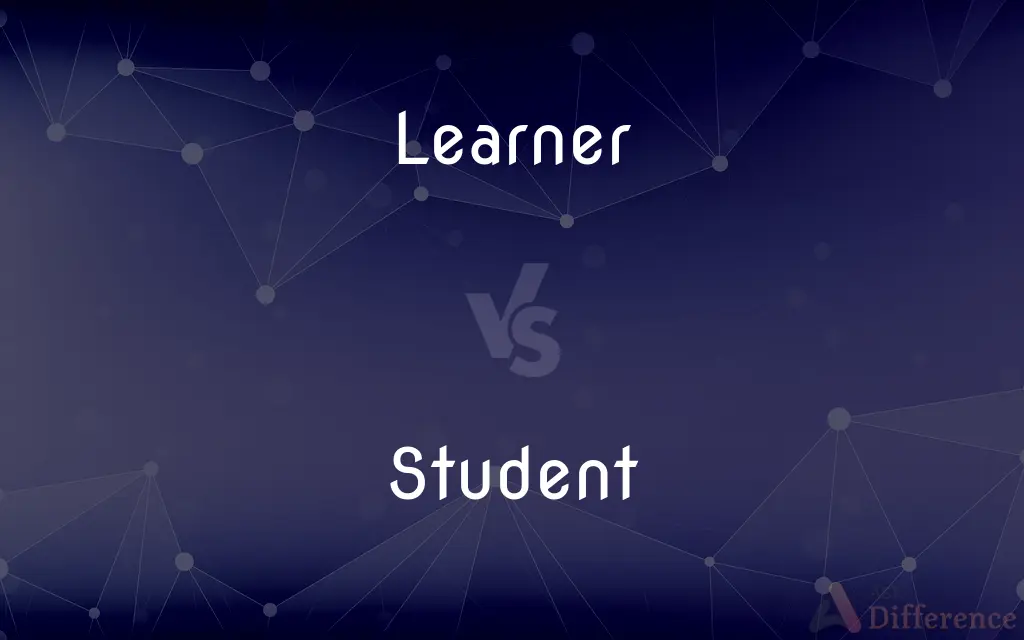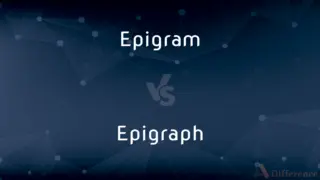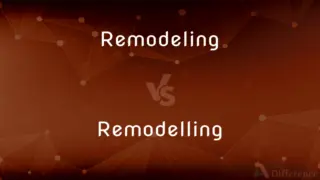Learner vs. Student — What's the Difference?
By Maham Liaqat & Urooj Arif — Updated on April 30, 2024
Learner refers to anyone who is actively acquiring knowledge or skills, often self-directed; student specifically denotes someone enrolled in formal educational institutions.

Difference Between Learner and Student
Table of Contents
ADVERTISEMENT
Key Differences
A learner encompasses a broader category of individuals who engage in the process of gaining knowledge or skills in any setting, driven by personal interest or necessity. On the other hand, a student is typically associated with formal education at schools, colleges, or universities where there is a structured curriculum.
Learners often pursue learning according to their pace and interest, which can include informal settings like online platforms, workshops, or self-study. Whereas students usually follow a set syllabus and academic schedule imposed by their educational institutions.
The motivation of a learner can be intrinsic, spurred by personal curiosity or professional development. Conversely, students might be motivated by extrinsic factors such as requirements for academic progression or the need to obtain certifications and degrees.
Learners have the flexibility to choose what, when, and how they learn, often making use of a variety of resources beyond traditional classrooms. On the other hand, students are more likely to be bound by academic guidelines and rely primarily on educators and formal textbooks.
While learners may include individuals of any age engaging in any kind of learning activity, students are more specifically defined and often younger individuals in primary, secondary, or tertiary educational systems.
ADVERTISEMENT
Comparison Chart
Definition
Anyone engaged in acquiring knowledge or skills
Someone formally enrolled in school
Setting
Any, often informal
Formal educational institutions
Motivation
Intrinsic and varied
Often extrinsic, structured by curriculum
Learning Pace
Self-directed and flexible
Structured and institutionally dictated
Resource Dependency
Diverse and self-selected
Primarily educational materials and staff
Compare with Definitions
Learner
A person who is gaining new knowledge or skills.
A lifelong learner pursues knowledge beyond traditional schooling.
Student
A person enrolled in an educational institution.
She is a student at the local university studying biology.
Learner
An individual involved in informal education.
She is a learner in online coding tutorials.
Student
An individual pursuing academic qualifications.
She is a doctoral student in chemistry.
Learner
A participant in professional development activities.
As a learner at the workshop, she enhanced her management skills.
Student
Someone who attends school under a formal system.
Students must adhere to the school's academic calendar.
Learner
Someone learning through practical experience.
He became a proficient baker purely as a passionate learner.
Student
A learner under the guidance of teachers.
As a student, he regularly completes assignments and projects.
Learner
Any individual actively engaged in educational activities.
They are learners in a community art class.
Student
A recipient of formal education.
As a student, he benefits from access to extensive university resources.
Learner
To gain knowledge of or skill in through study, instruction, or experience
Learned how to sail.
Learned the new computer program.
Learn to speak Hindi.
Student
A student is primarily a person enrolled in a school or other educational institution and who is under learning with goals of acquiring knowledge, developing professions and achieving employment at desired field. In the broader sense, a student is anyone who applies themselves to the intensive intellectual engagement with some matter necessary to master it as part of some practical affair in which such mastery is basic or decisive.
Learner
To become aware or informed of; find out
Learned the truth about him.
Learned that it was best not to argue.
Student
One who is enrolled or attends classes at a school, college, or university.
Learner
To fix in the mind or memory; memorize
Learned the speech in a few hours.
Student
One who studies something
A student of contemporary dance.
Learner
(Nonstandard) To cause to acquire knowledge; teach.
Student
An attentive observer
A student of world affairs.
Learner
(Obsolete) To give information to.
Student
A person who studies or learns about a particular subject.
She is a student of human interactions.
He is a student of life.
Learner
To gain knowledge, information, comprehension, or skill
Learns quickly.
Learned about computers.
Learned of the job through friends.
Student
A person who is formally enrolled at a school, a college or university, or another educational institution.
The students were out raising funds for rag week.
Learner
One who is learning.
She’s still a learner, so she’s prone to making mistakes.
Cambridge University Press has released a new series aimed at young learners with epilepsy.
Student
(in particular) A person who is enrolled at a college or university primary]] or secondary school.
Learner
One who learns; a scholar.
Student
A person engaged in study; one who is devoted to learning; a learner; a pupil; a scholar; especially, one who attends a school, or who seeks knowledge from professional teachers or from books; as, the students of an academy, a college, or a university; a medical student; a hard student.
Keep a gamester from the dice, and a good student from his book.
Learner
Someone (especially a child) who learns (as from a teacher) or takes up knowledge or beliefs
Student
One who studies or examines in any manner; an attentive and systematic observer; as, a student of human nature, or of physical nature.
Learner
Works for an expert to learn a trade
Student
A learner who is enrolled in an educational institution
Student
A learned person (especially in the humanities); someone who by long study has gained mastery in one or more disciplines
Common Curiosities
What defines a student?
A student is specifically someone enrolled in formal educational settings like schools or universities.
What defines a learner?
A learner is anyone engaged in the process of acquiring knowledge or skills, in any setting.
How do the environments of learners and students differ?
Learners can be in various settings, including informal ones, while students are typically in structured educational environments.
What are typical activities of a learner?
Learners engage in activities like self-study, online courses, workshops, and practical experience.
Are the motivations different between a learner and a student?
Yes, learners are often motivated by personal interest, while students may be motivated by academic requirements.
Can a student be a learner?
Yes, all students are learners, but not all learners are students.
Who uses more varied resources, learners or students?
Learners often use a broader range of resources, whereas students primarily use educational materials provided by their institutions.
Is age a factor in distinguishing a learner from a student?
Learners can be of any age, engaging in learning at any stage of life, while students are often younger and involved in formal education.
Can learning be informal for students?
While students learn in formal settings, they can also engage in informal learning outside their curriculum.
How flexible is the learning for learners compared to students?
Learners often have more flexibility in their learning choices and pace compared to students.
What are typical activities of a student?
Students participate in classes, complete assignments, take exams, and follow a curriculum.
Share Your Discovery

Previous Comparison
Epigram vs. Epigraph
Next Comparison
Remodeling vs. RemodellingAuthor Spotlight
Written by
Maham LiaqatCo-written by
Urooj ArifUrooj is a skilled content writer at Ask Difference, known for her exceptional ability to simplify complex topics into engaging and informative content. With a passion for research and a flair for clear, concise writing, she consistently delivers articles that resonate with our diverse audience.
















































